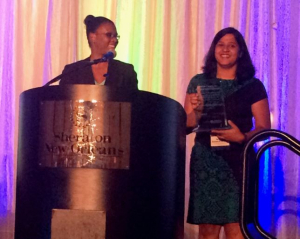A scant few months before she defends her dissertation for a Ph.D. in environmental engineering, Aparna Balasubramani found herself on a podium in New Orleans in January receiving an award for a paper she wrote on ridding waterways of toxic chemicals. The award came at the Battelle organization’s Ninth International Conference on Remediation and Management of Contaminated Sediments, one of the most prestigious professional gatherings in her field.
In front of 1,190 scientists, engineers, regulators and other environmental professionals from more than 20 countries, Balasubramani accepted her award and thought, “Okay, what I’m doing is not too bad, people are okay with my work!”
Okay and then some. She was awarded runner-up in the student paper competition for her article titled Remediation of polychlorinated biphenyls (PCBs) in sediment using carbon-based materials. In the paper, Balasubramani takes on dredging, the common way of eliminating hazardous PCBs, by exploring nanomaterials that may do less harm.
“Dredging is costly, limited in its effectiveness and in some cases has also led to mobilization of the pollutants,” she said. Her paper explores the alternative, using carbon-based materials to soak up the PCBs. She tested many materials in the lab and carbon nanotubes, a derivative of carbon, came out the clear winner.
Balasubramani says PCBs have been a constant threat in waterways since the middle of the 20th century when industry growth was rapidly outpacing environmental regulations or technology that might have prevented them from being spilled into the oceans.
“Due to poorly maintained hazardous waste sites, illegal disposal, electrical equipment leakage and incineration of waste, compounds like PCBs were deposited in sediments in numerous bays and estuaries in the U.S. and elsewhere,” she said.
Regarding her findings, Balasubramani acknowledges a long road ahead, but is happy about this breakthrough.
“There are so many more experiments that would have to be done but this is a first – nobody else has found that carbon nanotubes work better,” she said.
Noted by international scientists and engineers and awarded thusly.
